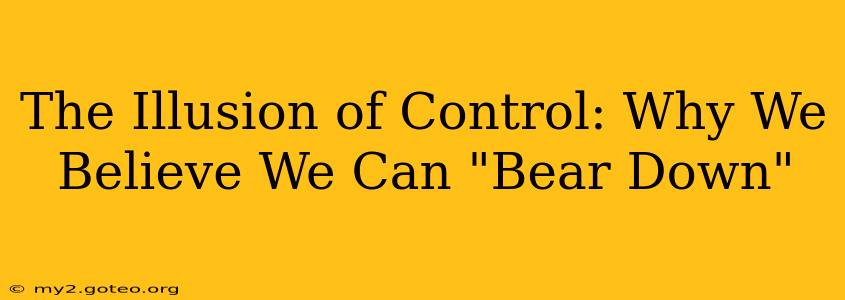We've all been there. Facing a looming deadline, a challenging task, or a stressful situation, we tell ourselves, "I just need to bear down and focus," believing that sheer willpower can overcome any obstacle. This belief, however, often rests on the shaky foundation of the illusion of control. While determination is undoubtedly valuable, understanding the psychological mechanisms behind this illusion can help us manage expectations and approach challenges more effectively. This article delves into the pervasive nature of this illusion, exploring its roots in cognitive biases and offering strategies for a more realistic and productive approach to difficult situations.
What is the Illusion of Control?
The illusion of control is a cognitive bias where individuals overestimate their ability to influence outcomes that are largely outside their control. We tend to believe we have more power over events than we actually do, leading to inflated confidence and potentially risky decision-making. This is particularly prevalent when dealing with uncertainty or ambiguity, where we seek to impose order and predictability even when it's unwarranted. The "bear down" mentality is a perfect example—it’s the belief that through sheer effort, we can bend reality to our will, regardless of external factors or inherent limitations.
Why Do We Believe We Can "Bear Down" and Succeed?
This belief stems from several interconnected psychological factors:
1. The Need for Predictability and Certainty:
Humans are inherently averse to uncertainty. The illusion of control provides a sense of predictability and security in chaotic situations. By believing we can control the outcome, we alleviate anxiety and maintain a sense of agency. This is especially true under pressure, where the need for control becomes amplified.
2. Self-Serving Bias:
Our tendency to attribute successes to our own abilities and failures to external factors further fuels the illusion. When we succeed despite unfavorable odds, we reinforce the belief in our power to "bear down" and overcome challenges. Conversely, failures are often dismissed as circumstantial, rather than a reflection of our actual limitations.
3. The Availability Heuristic:
This cognitive shortcut involves overestimating the likelihood of events that are easily recalled. If we remember past instances where "bearing down" worked, we're more likely to believe it will work again, even if those successes were due to chance or other factors.
4. The Planning Fallacy:
This bias leads us to underestimate the time and resources needed to complete a task. When we create overly optimistic plans, we believe we can “bear down” and compensate for any delays or unforeseen obstacles, even if that’s unrealistic.
How Can We Overcome the Illusion of Control?
Recognizing the illusion of control isn't about eliminating ambition or effort; it's about developing a more realistic and balanced perspective. Here are some strategies:
1. Acknowledge External Factors:
Before "bearing down," honestly assess the situation. Identify external factors beyond your control that might impact the outcome. Acknowledging these doesn't diminish your effort; it allows for more realistic planning and adaptation.
2. Break Down Large Tasks:
Instead of feeling overwhelmed by a massive undertaking, break it into smaller, manageable steps. This provides a sense of progress and reduces the feeling of being completely at the mercy of external forces.
3. Seek Feedback and Perspective:
Talking to others can offer a valuable external perspective. Others may identify obstacles you've overlooked or offer different approaches that might be more effective.
4. Practice Mindfulness:
Mindfulness techniques can help you become more aware of your thoughts and emotions. This increased self-awareness can help you identify when the illusion of control is influencing your thinking and decision-making.
5. Develop Contingency Plans:
Prepare for potential setbacks. Developing alternative plans for various scenarios can help mitigate the impact of unexpected events and reduce the feeling of helplessness.
Is "Bearing Down" Ever Effective?
While the illusion of control can be detrimental, the underlying drive to persevere and work diligently is crucial for success. The key is to channel that determination effectively, tempering it with realistic expectations and a balanced understanding of external factors. "Bearing down" can be effective when combined with realistic planning, a proactive approach to problem-solving, and the willingness to adjust strategies when necessary. It’s about combining focused effort with adaptability—a potent combination for achieving goals.
In conclusion, understanding the illusion of control is crucial for navigating challenges successfully. By recognizing this cognitive bias, we can develop more realistic strategies, manage expectations, and ultimately achieve better outcomes. The ability to "bear down" is valuable, but only when grounded in self-awareness and a healthy perspective on what we can realistically control.

